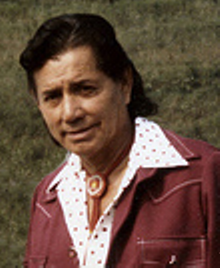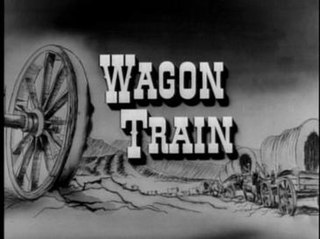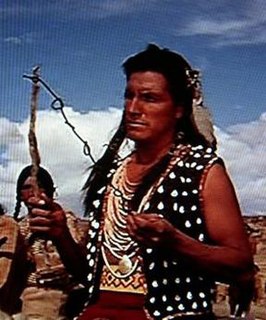
The Western is a genre of fiction typically set in the 19th or early 20th century in the Western United States, commonly referred to as the "Old West" or the "Wild West" and depicted in Western media as a hostile, sparsely populated frontier in a state of near-total lawlessness patrolled by outlaws, sheriffs, and numerous other stock "gunslinger" characters. Western narratives commonly concern the gradual attempts to settle and civilize the untamed and crime-ridden American West, often in service of wider themes of justice, freedom, Manifest Destiny, and the national history and identity of the United States.

Dances with Wolves is a 1990 American epic Western film starring, directed, and produced by Kevin Costner in his feature directorial debut. It is a film adaptation of the 1988 novel Dances with Wolves by Michael Blake that tells the story of Union Army Lieutenant John J. Dunbar (Costner), who travels to the American frontier to find a military post, and who meets a group of Lakota.

Jay Silverheels was an Indigenous Canadian actor and athlete. He was well known for his role as Tonto, the Native American companion of the Lone Ranger in the American Western television series The Lone Ranger.

Kiowa people are a Native American tribe and an indigenous people of the Great Plains of the United States. They migrated southward from western Montana into the Rocky Mountains in Colorado in the 17th and 18th centuries, and eventually into the Southern Plains by the early 19th century. In 1867, the Kiowa were moved to a reservation in southwestern Oklahoma.

Red Cloud's War was an armed conflict between an alliance of the Lakota, Northern Cheyenne, and Northern Arapaho peoples against the United States that took place in the Wyoming and Montana territories from 1866 to 1868. The war was fought over control of the western Powder River Country in present north-central Wyoming.

Plenty Coups was the principal chief of the Crow Nation ("Apsáalooke") and a visionary leader.

Wagon Train is an American Western series that aired 8 seasons: first on the NBC television network (1957–1962), and then on ABC (1962–1965). Wagon Train debuted on September 18, 1957, and became number one in the Nielsen ratings. It is the fictional adventure story of a large westbound wagon train through the American old West, from Missouri to California. Its format attracted different famous guest stars per episode, as travelers or as residents of the settlements they encountered. The show initially starred supporting film actor Ward Bond as the wagon master and Robert Horton as the scout.

Plains Indians or Indigenous peoples of the Great Plains and Canadian Prairies are the Native American tribes and First Nation band governments who have historically lived on the Interior Plains of North America. While hunting-farming cultures have lived on the Great Plains for centuries prior to European contact, the region is known for the horse cultures that flourished from the 17th century through the late 19th century. Their historic nomadism and armed resistance to domination by the government and military forces of Canada and the United States have made the Plains Indian culture groups an archetype in literature and art for Native Americans everywhere.

The Bozeman Trail was an overland route in the western United States, connecting the gold rush territory of southern Montana to the Oregon Trail in eastern Wyoming. Its most important period was from 1863–68. Despite the fact that "the major part of the route in Wyoming used by all Bozeman Trail travelers in 1864 was pioneered by Allen Hurlbut", it was named after John Bozeman. Many miles of the Bozeman Trail in present Montana followed the tracks of Bridger Trail, opened by Jim Bridger in 1864.
Matȟó Wayúhi was a Brulé Lakota chief who signed the Fort Laramie Treaty (1851). He was killed in 1854 when troops from Fort Laramie entered his encampment to arrest a Sioux who had shot a calf belonging to a Mormon emigrant. All 30 troopers in the army detachment were annihilated, in what would be called the Grattan massacre or "the Mormon Cow War" according to Army Historian S.L.A. Marshall in his book Crimsoned Prairie. Little Thunder took over as chief after his death.

The Lone Ranger and Tonto Fistfight in Heaven is a 1993 collection of interconnected short stories by Sherman Alexie. The characters and stories in the book, particularly "This Is What It Means to Say Phoenix, Arizona", provided the basis of Alexie's screenplay for the film Smoke Signals.

The Oglala are one of the seven subtribes of the Lakota people who, along with the Dakota, make up the Očhéthi Šakówiŋ. A majority of the Oglala live on the Pine Ridge Indian Reservation in South Dakota, the eighth-largest Native American reservation in the United States.

A Man Called Horse is a 1970 Western film directed by Elliot Silverstein, produced by Sandy Howard, and written by Jack DeWitt. It is based on the short story "A Man Called Horse" by the Western writer Dorothy M. Johnson, first published in 1950 in Collier's magazine and again in 1968 in Johnson's book Indian Country. The basic story was used in a 1958 episode of the television series Wagon Train, titled "A Man Called Horse". The film stars Richard Harris as the titular character, alongside Judith Anderson, Jean Gascon, Manu Tupou, Corinna Tsopei, Dub Taylor, and James Gammon.

Fools Crow is a 1986 novel written by Native American author James Welch. Set in Montana shortly after the Civil War, this novel tells of White Man's Dog, a young Blackfeet Indian on the verge of manhood, and his band, known as the Lone Eaters. The invasion of white society threatens to change their traditional way of life, and they must choose to fight or assimilate. The story is a portrait of a culture under pressure from colonization. The story culminates with the historic Marias Massacre of 1870, in which the U.S. Cavalry killed a friendly band of Blackfeet, consisting mostly of non-combatants.
Daisy Town is a 1971 French-Belgian film based upon the comic book character Lucky Luke and making it his first animated appearance. A Lucky Luke comic based on the film, with the title Daisy Town was released in 1982, drawn by Pascal Dabère.
In August, 1851, a band of Shoshoni Indians led by Cho Cho Co reportedly attacked a wagon train led by Thomas Clark on the Oregon Trail near where the Raft River joins the Snake River in present-day Idaho. Afterward, reports held that the Indians' primary objective was to steal horses from Thomas Clark's wagon train party, and that the Indians killed Clark's mother and brother and another man traveling with them during the horse robbery.

Eddie Little Sky, also known as Edward Little, was an indigenous North American actor of the Oglala Lakota tribe. He had parts in 36 feature films and over 60 television shows, mainly westerns in the role of a Native American. He was one of the first Native American actors to play Native American roles such as his performance in the 1970 film A Man Called Horse.

White Horse was a chief of the Kiowa. White Horse attended the council between southern plains tribes and the United States at Medicine Lodge in southern Kansas which resulted in the Medicine Lodge Treaty. Despite his attendance at the treaty signing he conducted frequent raids upon other tribes and white settlers. Follower of such elders as Guipago, Satanta and old Satank, he was often associated with Big Tree, this one too a young war leader in the Kiowa nation.

Black Beaver or Se-ket-tu-may-qua was a trapper and interpreter who worked for the American Fur Company. He served as a scout and guide as he was fluent in English, as well as several European and Native American languages. He is credited with establishing the California and Chisholm trails.
Pioneer Days is a Mickey Mouse short animated film first released on November 20, 1930, as part of the Mickey Mouse film series. It was the twenty-fourth Mickey Mouse short to be produced, the ninth of that year.
















